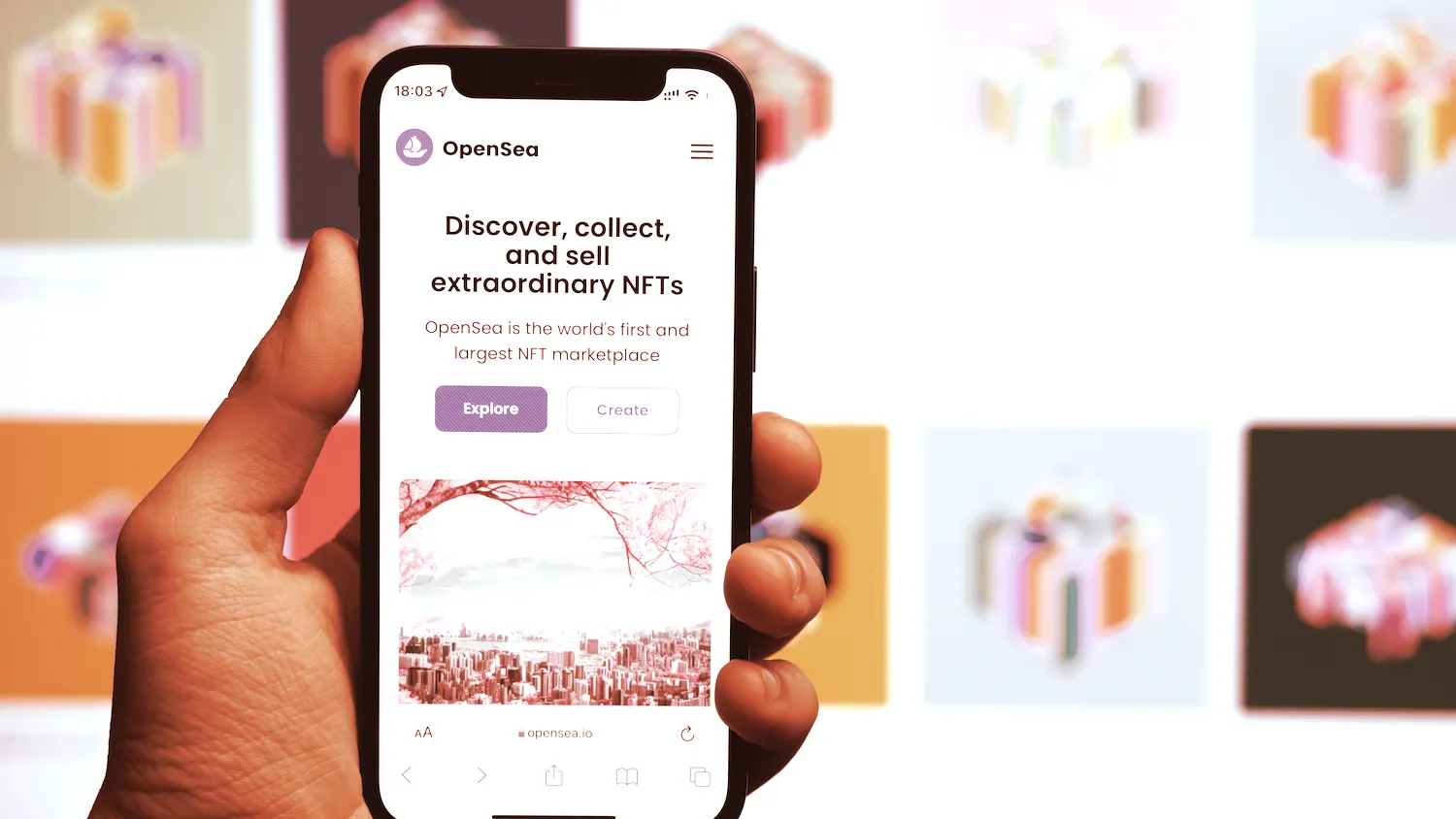In brief
- Top NFT marketplace OpenSea has limited the number of NFTs that each creator can mint using its own smart contract.
- NFT creators have spoken out about the decision, which not only limits new collections that use the contract but also existing ones on the platform.
UPDATE: Following backlash to its new limits, OpenSea announced on Thursday night that it has reversed the decision to limit collections minted with its smart contract. OpenSea attributed the original decision to increasing “misuse” of the feature, including to mint plagiarized artwork and fake collections. “We hear you and we’re sorry,” reads the tweet thread. The marketplace plans to explore other solutions to mitigate abuse, and wrote that it will share future changes in advance before adopting them.
OpenSea has led the NFT industry for the last six months with surging trading volume, and is currently enjoying a record-breaking month even as hot competition emerges and crypto prices sink. Today, however, the Ethereum NFT marketplace upset a lot of creators by limiting how many NFTs can be minted using its own internal collection storefront contract.
Early this morning, OpenSea’s new Twitter support account tweeted that it had “updated our collection storefront contract limits” to only allow five collections—apparently per NFT wallet or user—and a maximum of 50 items or NFT collectibles in each collection.
OpenSea’s primary Twitter account retweeted the original tweet this morning. A subsequent tweet in the thread added, “We know this change may impact our community so please don’t hesitate to share how this affects your creative flow.”
The NFT community has replied in force in the hours since the original tweet, with a wide array of creators and crypto industry personalities criticizing the marketplace for inhibiting collections that use OpenSea’s own NFT smart contract. A smart contract is a chunk of code that performs set instructions, and in this case, a minting contract manages ownership and transferability.
OpenSea’s change to its contract "limits onboarding new creators’ collections and is an unnecessary update from the community’s point of view,” Twin Flames creator Justin Aversano told Decrypt.
Creators can still choose to use their own external NFT smart contract to circumvent the limits. For example, Manifold—the Andreesen-backed smart contract startup that works with Steve Aoki and pplpleasr—lets users own and deploy their own customizable NFT minting contracts. Creators could also mint through a competing NFT marketplace, such as Rarible.
However, as some creators—such as Uglydoll co-founder David Horvath—have noted, the change also impacts existing collections that used OpenSea’s NFT contract. For those creators who have already minted 50 or more NFTs in an existing collection, they are now unable to continue adding to that collection. And they’re limited to five total collections, as well.
Horvath had gradually added single-edition NFT artwork pieces to OpenSea collections over the past year alongside wife and collaborator Sun-Min Kim. He tweeted today that he is now “locked out of minting new work or collections on OpenSea” due to the changes.
“It’s such a major misstep from a company at the forefront of such an incredible new world unfolding that it’s like eBay calling it quits after the third week of Beanie Babies,” Horvath told Decrypt via direct message. “Only this time, it’s not a fad or a collectible craze, but something which can really change lives.”
Over the last 21 years, Horvath has overseen the Uglydoll toy and entertainment franchise that he co-created with Kim, along with other creations. He has also minted about 1,000 pieces of artwork as NFTs to date. More recently, he joined the Ethereum NFT project Nouns and co-founded Nouns Studio1, an effort to build open-source intellectual property as a collective.
“I feel crushed for all of the independent creators out there who quit their jobs after seeing the potential for [NFTs] changing their own lives, and perhaps being the vehicle to support themselves for the first time,” Horvath told Decrypt, “and feel even worse for those who maybe just leapt in and felt hope for the first time in a long time.”
OpenSea has not shared additional information about the move, as of this writing, with its tweet only noting that the change was made “to address feedback we’ve received about our creator tools.” Decrypt reached out to OpenSea for comment and further information, including whether it plans to reconsider the decision, but did not immediately hear back.
Other players in the NFT space may attempt to fill the void if OpenSea sticks to its guns, however. New rival LooksRare tweeted that it plans to build direct minting capabilities into its recently-launched marketplace, although “delivering it will take time,” it tweeted. Meanwhile, Manifold co-founder Richerd Chan tweeted that the firm is looking at how it could potentially let users migrate NFTs from an OpenSea contract into a creator-owned contract.
Even if OpenSea ultimately changes course or tweaks the limits, Horvath said he’s seen enough. He is excited about the upcoming launch of Coinbase’s NFT platform, and plans to explore the community there once it’s live.
“This is probably the worst response to some pretty wonderful competition emerging and others opening up just around the corner. Very sad to see,” he said of OpenSea. “For me personally, I wouldn’t even care if they reversed this one hour later. The fact that they would put this out there and let people wake up to it—I’m done with them.”
Daily Debrief Newsletter
Start every day with the top news stories right now, plus original features, a podcast, videos and more.

